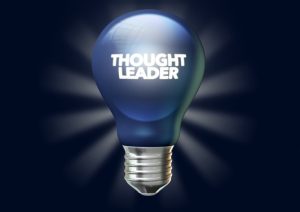
Some people think the term thought leadership is a new buzzword. In reality, the term dates back to the late 1800s when Henry Ward Beecher was touted as “one of the great thought leaders in America” (Oxford English Dictionary). A thought leader is recognized as an authority in a specialized field or topic. A thought leader’s expertise is sought out by others. What are the implications and the expected rewards of thought leadership? It varies. Sometimes coveted invitations to social events, increased political or corporate power, prestigious industry awards and recognition, a positive reputation in the marketplace, and yes, more business…
Becoming a Thought Leader
If you want to become a thought leader, here are four steps to take:

- Participate in industry tradeshows and conferences, not only as a registrant but as a speaker and/or exhibitor. The more often you are seen in person, the more visibility you have in your marketplace.
- Continue your education and professional development. Become an avid reader of white papers, books, magazines, white papers, social media sites and other sources of information. Consider pursuing an advanced degree. Participate in industry training programs and webinars. This type of activity builds your knowledge base and confidence in your developing expertise.
- Become a noted author. Write frequently for blogs, trade journals and other publications read by your target markets and peers. Consider writing a book. While time-consuming, it separates you from others in your field. The content you create positions you as an industry leader.
- Take the time to outline your positions on key issues that affect your industry and your business. Thought leaders are innovative, and yes, sometimes controversial. Communicate your theories, philosophy, concepts and ideas frequently to internal and external audiences.
“Thought leaders are the informed opinion leaders and the go-to people in their field of expertise. They are trusted sources who move and inspire people with innovative ideas”
– Denise Brosseau
Thought Leaders are Experts
Some people consider themselves a thought leader simply because they are a published author or occasional speaker. But thought leadership is more: it is about becoming a go-to resource for expertise. As a thought leader, you deliver relevant answers to the pressing questions on the minds of your target audience. Thought leaders offer creative, actionable and valuable business ideas and expertise. When this is done correctly, you and your business will be rewarded.

